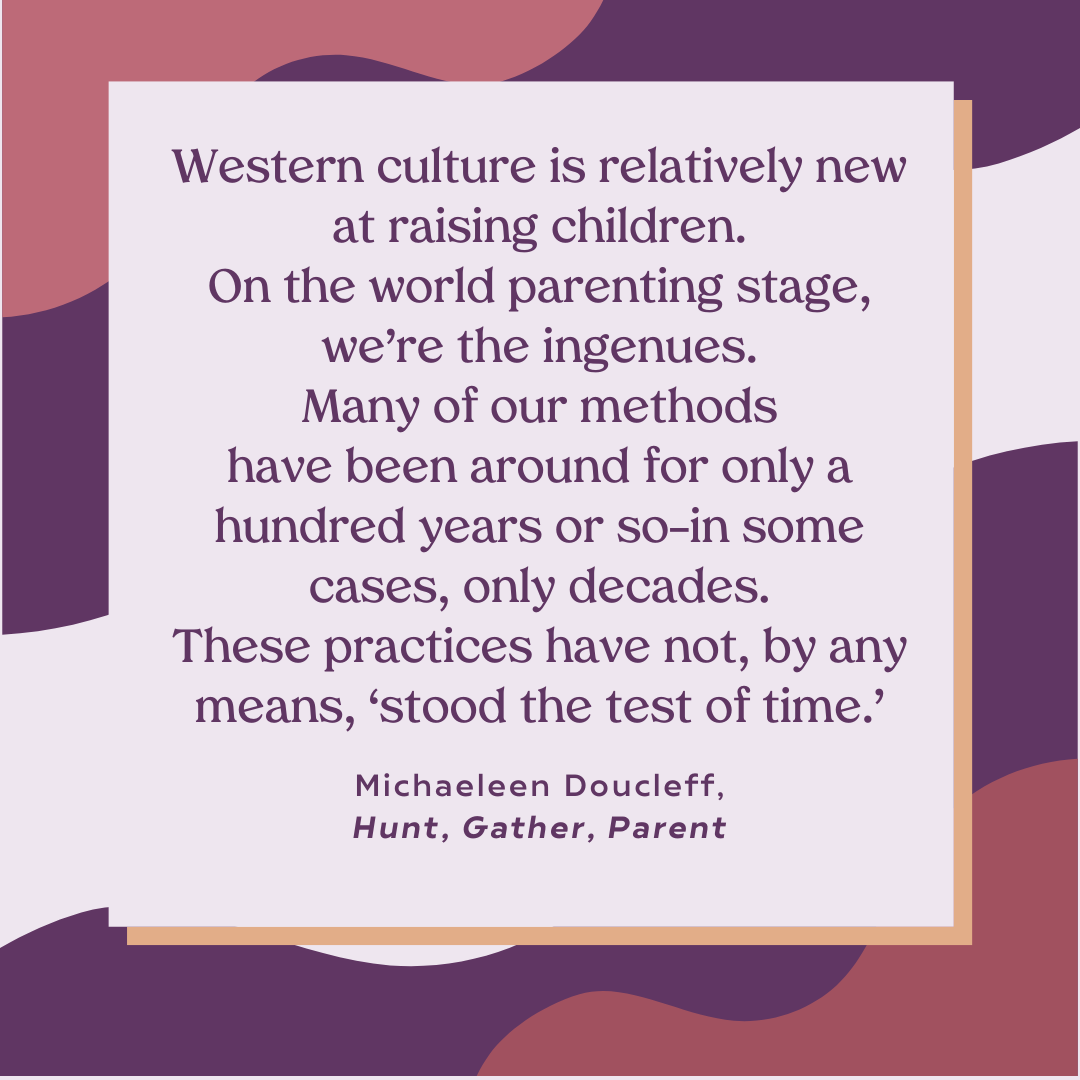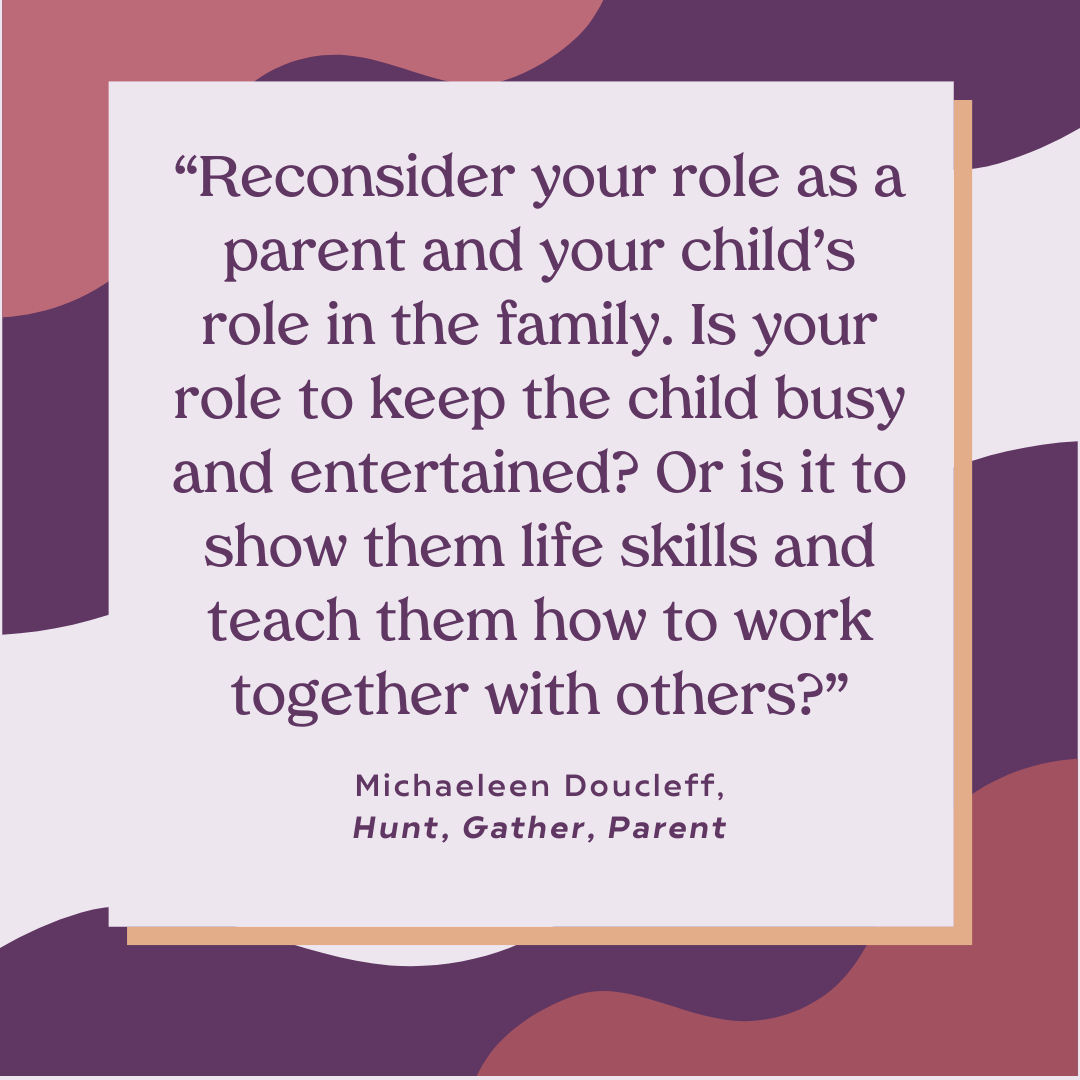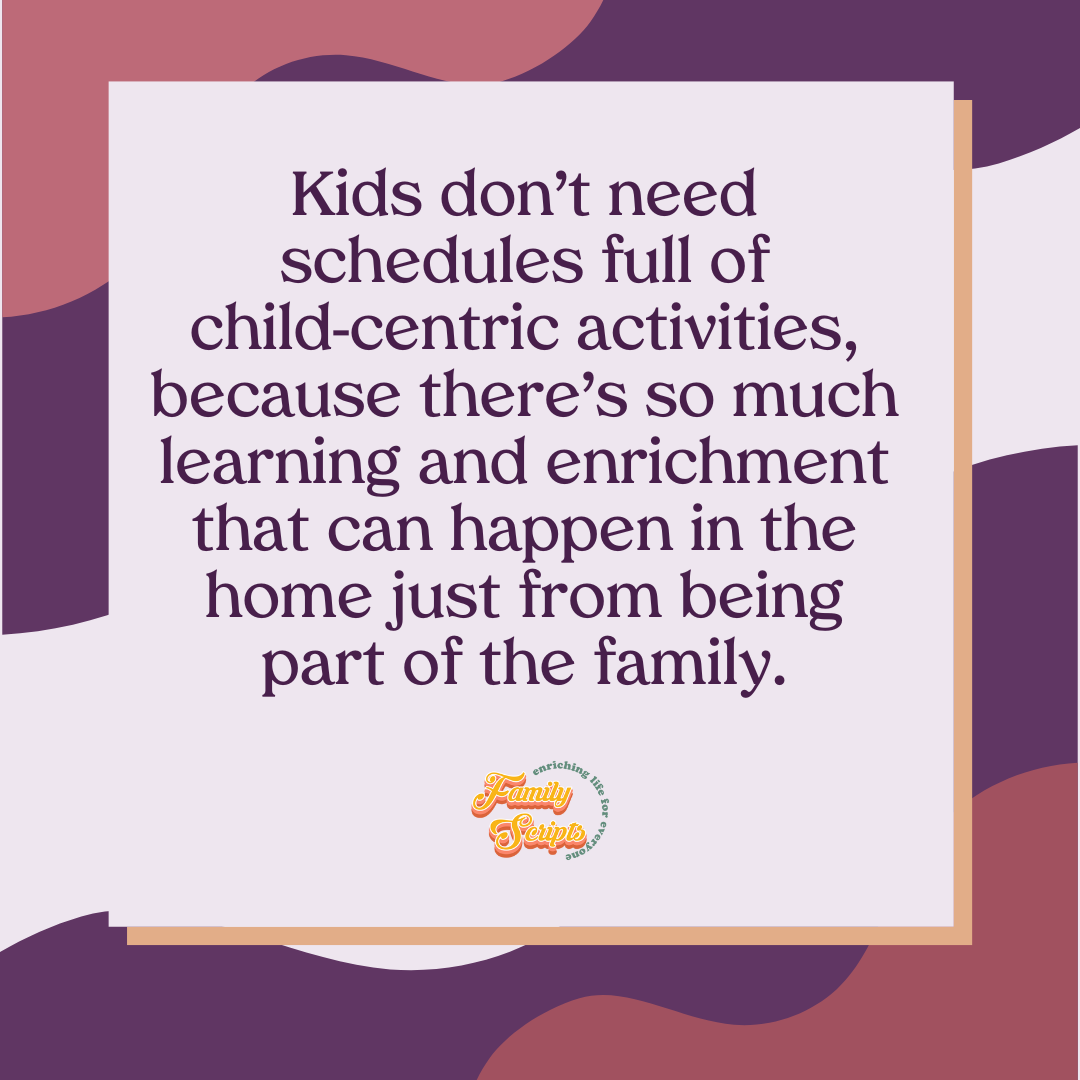Weird American Parenting + Acomedido
some incredible insights from this month's book club pick
Hello! Usually we share activity ideas on Tuesdays, but this week it made more sense to introduce a concept from this month’s book first. No worries if you have no intention to read Hunt, Gather, Parent on your own; we’re sharing some key quotes and insights in this 5-minute email that just might change your whole life.
Weird American Parenting
In the first part of the book, Michaeleen explains how many things that Westerners expect to be “normal”—like our parenting approach—really just reveal ourselves as the outliers when compared to the rest of the world. The nuclear family is kind of a new idea, and it hasn’t proven to be a good one.
America’s postpartum depression rates—and all depression rates—are terrifying; we rank only behind Ukraine in depression right now. Why should modern American parenting books be accepted so quickly when there are cultures who have been holding to the same parenting values for thousands of years with consistent results?
“For starters, Western culture is relatively new at raising children. On the world parenting stage, we’re the ingenues. Many of our methods have been around for only a hundred years or so—in some cases, only decades. These practices have not, by any means, ‘stood the test of time.’” (pg 24)
And this is why we’ll be sharing from Hunt, Gather, Parent during a month focusing on curiosity and humility: How have other cultures been raising kids all these years? Maybe there’s something that gentle parenting, authoritarian parenting, attachment parenting, free range parenting, etc. are missing?
You might not agree with everything from other cultures—including the advice in this book; I don’t agree with all of it—but a teachable heart welcomes hard-won wisdom. Let’s learn from some pro moms.
Acomedido
The first culture Michaeleen visited was people of Mayan and Nahuan descent in the Yucatán Peninsula. She shared a word that we don’t really have an English equivalent for: acomedido. It means being helpful, the skill of paying attention and then acting (pg 53)
In Mexico, you probably won’t find many chore charts or reward systems on fridges. The secret is all about intrinsic motivation1. The goal is that children are sold on the idea of being a helpful part of the family team—even from toddlerhood—so they actively look for what needs to be done and they do it.
Michaeleen visited a mom named Teresa to see how her kids got ready for school. Here’s how she describes it:
“Teresa basically transforms into a conductor—or better yet, a baseball manager, silently directing the team from the dugout. Rather than issuing a loud stream of instructions, threats, and explanations, she communicates through facial expressions and hand gestures. A twitch of the nose means ‘Start getting dressed’; a tug on the ear means ‘Brush your hair’; and a quick nod of the head means ‘You’re doing a good job.’ If you don’t pay close attention, you’ll miss all the directions.” (pg 79)
I’ve never seen anything like that before! Here’s a wonderful challenging thought:
“Reconsider your role as a parent and your child’s role in the family. Is your role to keep the child busy and entertained? Or is it to show them life skills and teach them how to work together with others?” (pg 95)
Questions for Reflection (+ a confession)
How might the chore charts/responsibility systems I have in place be potentially damaging to my child’s intrinsic motivation?
Are my kids paying attention to what needs to be done? How could that be a skill that will help them later in life?
Do I include my kids in my tasks or try to work as separately as I can? What are they learning from the work ethic they see from me?
Do my kids feel like a valuable part of the team?
Do I praise my kids too often? Do they constantly look for approval or do they know how to be proud of themselves?
Who seems to be doing a good job at this? How can I learn more from them?
To be honest, I am not good at this. In the month after reading this book, I’ve been trying to teach my kids to be acomodido, but it’s been challenging to un-do years of parenting that’s been geared towards extrinsic motivation and low expectations. Trying to help five kids at once—including a very active toddler—doesn’t help.
But something that happened last year still inspires me: I had friends over for dinner who came from a family of 9 and a family of 10. By the time I put my baby down to bed, they had already done all the dishes, deep-cleaned my kitchen, and straightened up my shelves…with a smile. They grew up being trained to see what needed to be done and work as a team, and that proved to be a valuable skill (and a wonderful gift to me, their host!) I cried later because I wanted that desire for helpfulness so badly for my kids, but I’ve had trouble figuring out how to get there.
I think the key is inclusiveness. Kids want to be a genuinely valuable member of the team. If we all work together to cook, clean up from meals, do the laundry, make cards for people, etc., then we all get more free time. Kids don’t need schedules full of child-centric activities, because there’s so much learning and enrichment that can happen in the home just from being part of the family. And—eventually—it’ll pay off so I get more time to relax by myself, too.
That’s enough for today; tomorrow and Thursday will have some specific ideas!
Warmly,
Hope from Family Scripts
My friend Tania has an incredibly smart newsletter devoted to the topic of intrinsic motivation. Check out Why Would Anyone?









I definitely have a lot of opportunity for growth in acomodido too, but a few things I do with my own kids to this end do seem to be paying off:
1) I frame whatever needs to be done as teamwork, whether it's for our own benefit or the benefit of others. We even have a name we call our family team. When we have a task, especially a big or hard one that no one really likes (carrying chopped wood into our storage area, for instance, which is heavy, dirty work and has to be done over and over and OVER in the late summer and fall if we want to enjoy our fireplace all winter), I say something like, "Miller Family Drum Circle, let's go! Many hands make light work! We can do this!" (Miller Family Drum Circle started as an inside joke when our children were babies but it stuck, and now my husband and I use it all the time to communicate that as family, we *are* a team.)
2) Instead of expecting my young children to understand what needs to be done -- to know that desire of helpfulness automatically -- I say what I see, and I model what I want. So after dinner I might be like, "I see a counter that needs to be wiped," and then I wipe it. Or, "I see dishes that need to go into the washer," and then I put them in. After only a little while of making my behavior explicit, my kids got it and started responding after I called it out. They're still not 100% able to do this without my scaffolding, but that's okay -- that's the way a skill gets built, and I have faith that they will get there. (Another version of this is, "I need a helper! Who wants to put toppings on the oatmeal this morning?" Or whatever. They are so eager to meet the call of "being a helper," but if I want them to do that, I have to say it; I can't expect them to see it on their own.)
3) I think one of the most powerful things we can do as parents is model the behavior we'd like to see. I could talk until I am blue in the face about the importance of serving other people, including each other as family, but what my children learn from is what *I am actually doing,* not what I'm saying. Anything I want in them or for them starts with me.
(And remember: you have years and years to cultivate this -- it's not a one-and-done thing, and you don't have to be perfect at it. It's not too late, so don't be too hard on yourself. Parents -- and families -- are a continual work in progress, and that's a gift, because it means we can change and grow and begin again at any moment.)
This is all so good including Sarah’s very helpful ideas. But like all good ideas, it’s leaving me with more questions/ponderings and I’m hoping this little community can help offer some insight. I’m listening to Smart Money Smart Kids (a Dave Ramsey book) and he suggests giving kids a commission on the work they do in the home to help them tie working hard equals getting paid. To an extent, I agree. I wish I had learned earlier about saving and spending and delaying gratification and it’s something I’d love to teach my daughter. But I also think paying kids for chores creates entitlement- I fed the cats, I get money instead of just being a contributing member of the family. No one pays me to feed the cats. Lol! I’m wondering where the balance is. I have a very helpful 3 1/2 year old who loves helping around the house. I’d hate to ruin the helpfulness by now paying her for the things she is currently doing that just helps with the day to day chores. 🤔🤔🤔